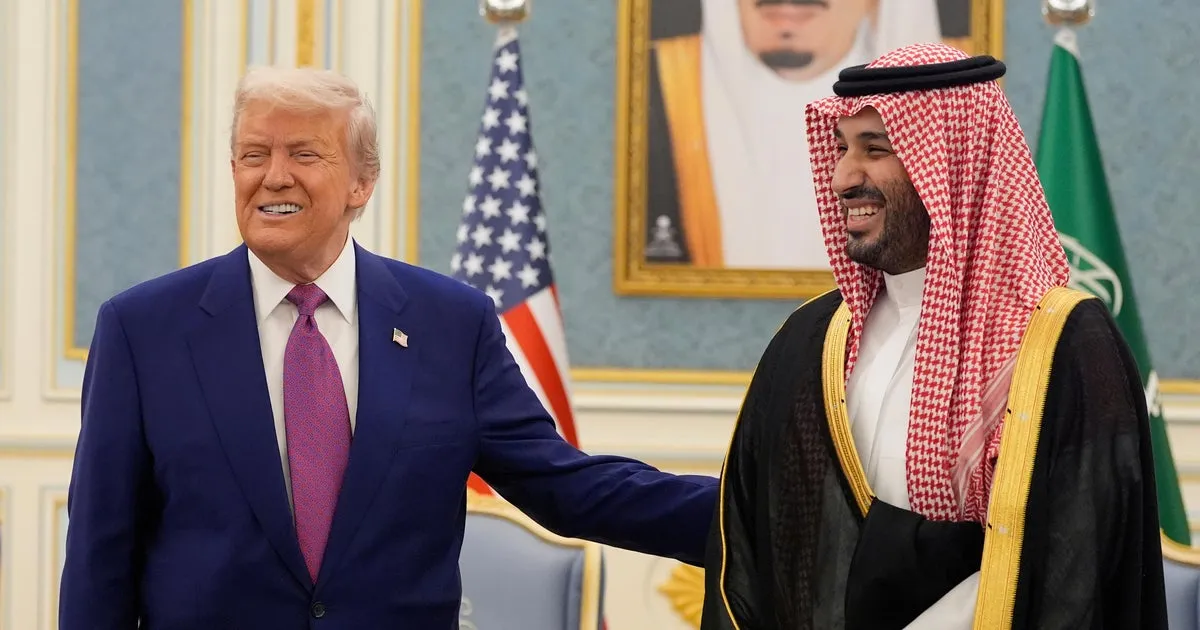
On Tuesday, President Trump is set to host a warm and elaborate welcome for Saudi Crown Prince Mohammed bin Salman, widely known as MBS, at the White House. This event underscores the administration's strong ties with the Saudi kingdom, as Trump aims to solidify significant business and national security agreements. Prior to bin Salman's arrival, Trump confirmed that the U.S. intends to sell F-35 fighter jets to Saudi Arabia, highlighting the ongoing military cooperation between the two nations.
The White House has organized a grand arrival ceremony for the crown prince, featuring cannons and the display of both U.S. and Saudi flags adorning the buildings. Additionally, an aircraft flyover by the U.S. military will take place during MBS' arrival, further emphasizing the importance of this diplomatic visit. Following the ceremony, a black-tie dinner will be held in honor of bin Salman, with approximately 120 guests invited, including 30 members from the Saudi delegation. Although this is not classified as a state dinner, it marks the first formal dinner hosted by President Trump for a foreign leader during his second term.
During this significant meeting, President Trump is expected to announce key initiatives regarding Saudi investment in U.S. AI infrastructure, enhanced collaboration on civil nuclear energy, defense sales, and the execution of the Saudis' ambitious $600 billion investment pledge. This pledge was initially unveiled during Trump's visit to Saudi Arabia in May. The agenda also includes an Oval Office meeting and a lunch, akin to the discussions Trump has conducted with other world leaders recently.
White House Deputy Press Secretary Anna Kelly described the trip as an official working visit and indicated that Americans can anticipate beneficial deals spanning technology, manufacturing, critical minerals, and defense.
Moreover, President Trump will attend a Saudi business summit in Washington, D.C., on Wednesday. The event, co-hosted by the Ministry of Investment of Saudi Arabia and the U.S.-Saudi Business Council, will take place at the John F. Kennedy Center for the Performing Arts. Both Trump and his former top adviser, Jared Kushner, have cultivated close ties with the Saudis, viewing them as essential partners for security and business in a volatile Middle East.
One of the critical topics during the visit will be the Abraham Accords, an agreement from Trump's first term that normalized diplomatic relations between Israel, Bahrain, and the UAE. Trump expressed hope that Saudi Arabia would soon join the accords, stating, “We've had tremendous interest in the Abraham Accords since we put Iran out of business.” However, the Saudis have indicated that their involvement hinges on establishing a path to Palestinian statehood.
This visit marks the crown prince's first U.S. trip since the controversial killing of journalist and human rights activist Jamal Khashoggi in 2018. Following an assessment by the CIA, which suggested that MBS had ordered the operation, Trump has maintained a relationship with the Saudi leader, viewing Saudi Arabia as a crucial ally despite the outcry over human rights abuses. While bin Salman has denied direct involvement, he accepted responsibility for the actions of those in his government.
Human rights advocates have voiced their discontent regarding the reception bin Salman is to receive in Washington, emphasizing the lack of accountability for Khashoggi's murder and the ongoing repression of activists in Saudi Arabia. Advocacy groups have urged Trump to address these critical issues during the diplomatic visit, including the release of imprisoned activists and a call for transparency regarding Khashoggi's remains.
As President Trump prepares to welcome Crown Prince Mohammed bin Salman, the complexities of U.S.-Saudi relations are laid bare. The diplomatic visit is not only a demonstration of economic and military partnerships but also a reminder of ongoing human rights concerns that continue to challenge the narrative of cooperation between the two nations. As discussions unfold, the world will be watching closely to see how these issues are addressed and what future implications this visit may have for U.S. foreign policy in the Middle East.